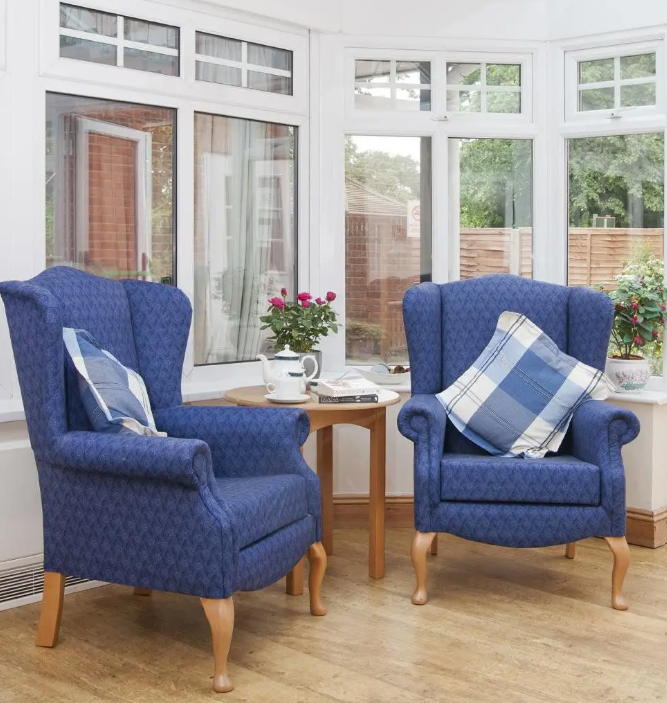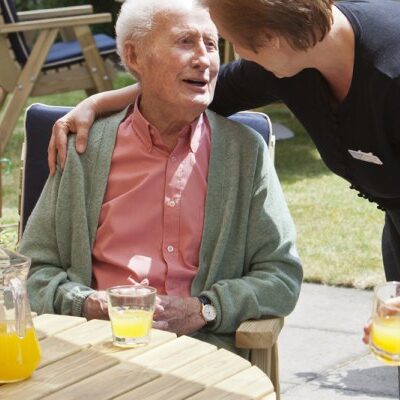At Murdoch House Care Home, we provide our residents with the highest quality of care in a nurturing environment. Our home is renowned for its warm and friendly atmosphere, which is complemented by its beautiful surroundings in Wokingham, Berkshire. Our dedicated Care teams are committed to helping residents maintain their independence and dignity, offering personalised care plans to ensure that residents receive the appropriate support for conditions such as Parkinson’s disease, stroke, and visual impairments, while also enjoying a comfortable and homely setting.
Our residents also enjoy an engaging and full activities program, participating in everything from themed quizzes and bingo to afternoon tea – all designed to promote social interaction and mental stimulation. And our well-maintained gardens and conservatory areas provide serene spaces for relaxation and outdoor enjoyment.
For all enquiries, including arranging a visit to Murdoch House, please complete the form at the bottom of this page, call 0118 911 7010, or visit the ‘Contact us’ section.


Murdoch_House_3
See what residents and their families say about our team, quality of care, and facilities at Murdoch House Care Home

Meet some of the compassionate Care team at Murdoch House, dedicated to creating a warm, safe, and supportive environment for every resident and their families.
Care Home Manager
Christine is our Care Home Manager at Murdoch House and focuses on ensuring we take a person-centered approach to the way we support every resident. She loves making a positive difference to people’s lives and connecting with the families of our residents as well as the wider community.


Assistant Care Home Manager
Marie is a very experienced care professional and our Assistant Care Home Manager at Murdoch House. She works closely with Christine and our amazing Care team to ensure we provide a loving, caring, and supportive environment to every resident and their families.


What type of care do you offer in Care Homes?
We do our best to meet the needs of our residents at all times, whether they are here for only one day or for a longer period of time. We also offer specialised care services, such as;
I’m looking for respite care, which of your homes offer this?
Most of our homes and the south east offer short-term care, which can be booked ahead of time or on short notice.
Are Belmont Care Homes certified and inspected by authorities?
The Care Quality Commission has signed up Belmont Care Homes and given its approval (CQC). The CQC looks for new ways to make sure that the health and social care services in England are safe, well-run, considerate, and of high quality.
What is the difference between a care home and a nursing home?
Nursing care is like residential care in that it helps people who need a registered nurse to watch over them all the time. Residential care gives people who need extra help and support a place to live that feels like home and is supervised by staff who are on call 24 hours a day, 7 days a week.
Are there any State Benefits we may be entitled to?
Most state benefits are based on a person’s income. Attendance Allowance is an exception. It is a tax-free state benefit that is paid to all people over 65 who have needed care (help with essential daily tasks like washing and dressing) for more than six months in a row.
There are two rates for Attendance Allowance: a lower rate for people who need help only during the day or night, and a higher rate for people who need help both day and night. In 2015/16, the lower rate is £55.10 per week and the higher rate is £82.30 per week. Claim forms can be picked up at larger Post Offices or Citizens Advice Bureaux, or they can be downloaded from www.direct.gov.uk.
People under 65 who need care will still be able to get an allowance, but it will be in the form of a Disability Living Allowance.
Is there free nursing care?
If a person in a nursing home is found to need nursing care from a registered nurse, the NHS will pay for it. This cost is a flat rate of £112 at the standard rate or £154.12 at the higher rate a week in England and £140.90 a week in Wales for 2015/16. It is called NHS-funded nursing care (formerly known as the registered nursing care contribution).
Anyone moving into a nursing home should be checked to see if they are eligible for nursing care paid for by the NHS. If so, the nursing home will receive this money immediately. After that, the assessment is done again every year, and it is possible that people will be re-banded after each one.
Continuing Health Care
Some people with long-term health needs may be able to get the Primary Care Trust to pay for all of their nursing home costs (PCT). A designated nurse from the PCT does a continuing care health assessment to see if a person is eligible. This assessment is then taken to a panel to talk about whether the person meets certain criteria.
The assessment should be done with the resident’s knowledge and input, as well as that of the person’s next of kin and any other professionals who are helping to care for the person. In some cases, like when a person has a terminal illness with a life expectancy of one month or less, the assessment process can be sped up.
What if we want a more expensive care home?
You can choose a care home that costs more than what your local council usually pays for a person with your assessed needs, but you may need to find a way to pay the difference.
If the council can find a place that meets your needs but you still want to move into a more expensive care home, they can ask a third party (usually a relative or friend) to pay the difference. This is called a ‘top-up fee’. Because you’ve been instructed to pay only what you can afford, you cannot pay this on your own.
If your local council can’t find a place in your area that meets your needs, they should be willing to pay more than they usually do.